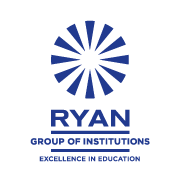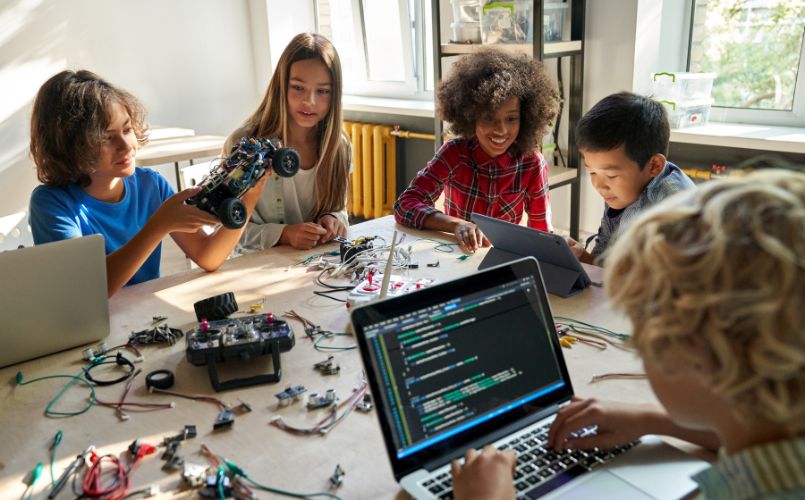As we stand at the cusp of a revolution in classrooms the rise of generative AI in education represents a significant moment in the evolution of education. This cutting edge technology, renowned for its ability to autonomously create content is set to reshape the landscape of learning and teaching. However like any change it brings forth a myriad of opportunities and challenges that educators and policymakers must carefully navigate.
Generative AI is inherently filled with potential offering applications that can revolutionize educational practices. From creating personalized learning materials to enabling learning experiences its capabilities are wide ranging. What does this mean for our teachers, students and the broader educational environment? How does generative AI fit into the future education scenarios and what impact will its incorporation have on personalized learning experiences?
The potential of AI in education extends beyond just its technological capabilities; it has the power to make education more accessible, engaging and customized to individual learning requirements. It introduces avenues, for learning, teaching methods and interaction with educational content.
However as we explore further into this future it is crucial to carefully consider these opportunities in light of ethical concerns, data privacy issues and the digital gap that come with incorporating AI technologies into educational environments.
Embracing Generative AI; A New Chapter in Education
The integration of generative artificial intelligence (AI) into the realm of education is reshaping the way knowledge is shared and absorbed. This state of the art technology, known for its capacity to independently create content stands at the forefront of educational progress offering a move towards more personalized and interactive learning settings. The essence of this evolution lies not in the technology itself but in its potential to democratize and tailor education making learning experiences more attuned to student requirements and preferences.
Fundamentally generative AI serves as a driver for change by providing tools that can transform teaching approaches and learning methods. The key question that emerges is; what implications does this hold for educators, learners and the educational framework at large? How can generative AI be utilized to improve results and equip students, for a future where technology and human skills are increasingly interconnected?
The influence of AI on education goes far beyond just technological progress; it signifies a transition towards an era where learning emphasizes not just rote memorization but also profound comprehension and creativity. It prompts educators to rethink their roles and adjust to an environment where AI tools support the development of inclusive and personalized learning experiences. Yet embracing this evolution necessitates an examination of the possibilities brought by generative AI along with the ethical and practical dilemmas that come with its integration into educational structures.
This exploration of AI in education commences with recognizing its potential to revolutionize traditional learning approaches. It sparks conversations about the ways AI can enhance educational objectives the obstacles that could hinder its adoption and the strategies for overcoming these challenges. As we delve into this journey our aim is to uncover the relationship between technology and education striving to offer insights that are both contemplative and forward looking.
Advantages Offered by Generative AI in Education
Tailored Learning Paths
One key benefit of AI is its capacity to customize educational content based on each students unique needs. By analyzing data, on students learning preferences, performance levels and styles AI can generate learning materials and assessments. This personalized approach ensures that students are kept at a learning pace without feeling overwhelmed by difficulty or bored by simplicity.
Improving Accessibility and Inclusivity
Generative AI also plays a role in enhancing educations accessibility for students with disabilities or those needing extra support. AI driven tools can provide real time captions for students who’re deaf or hard of hearing translate materials into different languages and adjust content to better suit students with learning challenges. This helps break down barriers that have traditionally limited access to education.
Interactive and Engaging Learning Experiences
In addition to personalization and accessibility generative AI brings levels of interactivity and engagement to the learning journey. By offering simulations and gamified learning experiences students can delve into complex concepts in a hands on way improving both comprehension and retention. These interactive experiences cater to diverse learning styles. Can make the educational experience more captivating and enjoyable for students.
Streamlined Administrative Processes
Apart from its educational advantages generative AI can streamline administrative responsibilities for educators and institutions. From grading assignments to managing schedules and communicating, with students AI automation can handle tasks freeing up educators to focus on teaching and engaging with their students. This efficiency contributes to a concentrated and productive educational setting.
Insights from Data Analysis for Teachers
Generative AI provides educators with insights into student performance and learning patterns. By examining data gathered through AI tools teachers can pinpoint areas where students face difficulties and adjust their teaching methods to tackle these issues. This data focused approach enhances the process by making it more responsive and efficient ultimately leading to better learning outcomes.
The impact of AI on education is significant. However the introduction of technology also poses a series of challenges and ethical dilemmas that need careful handling. In the following section we will delve into these challenges in depth taking into account issues related to data privacy the gap and the necessity for ethical guidelines in implementing AI in education.
Obstacles and Ethical Issues in Incorporating Generative AI in Education
While the integration of AI in educational environments holds promise it is not devoid of challenges. These hurdles span logistical, ethical and societal realms necessitating thorough deliberation and strategic planning for resolution.
Protecting Data Privacy and Security
A primary concern revolves around safeguarding student data when utilizing AI systems. These systems rely on data access, for optimal functioning.
Ensuring the protection and confidentiality of this data is crucial along with adhering to regulations such as the GDPR in Europe or the Childrens Online Privacy Protection Act (COPPA) in the United States. Institutions need to establish data security measures and openly communicate these practices to earn the trust of students and parents.
Ethical Bias Management
The ethical application of AI in education goes beyond safeguarding data privacy to address issues of bias and fairness. AI systems can unintentionally reinforce biases found in their training data resulting in unequal outcomes for specific student groups. Educators and developers must collaborate to identify and address these biases ensuring that AI tools promote educational opportunities for all students.
Closing the Gap
An important challenge is bridging the digital gap, which can worsen existing disparities in education. Not all students have access to the technology needed for AI driven learning benefits. Closing this gap requires efforts to offer essential infrastructure and resources guaranteeing that integrating AI into education does not marginalize disadvantaged communities.
Promoting Educational Equality
Linked closely with addressing the divide is enhancing educational equality, on a broader scale. The use of AI in education should prioritize inclusivity making sure that these technologies cater to a variety of learning needs without putting any student group at a disadvantage. It’s important to equip educators with the training and assistance to effectively incorporate AI tools into their teaching methods.
Getting Teachers Ready for a Changing Educational Environment
Ultimately the successful implementation of AI in education depends on how well prepared educators are. Teachers require training and support to make use of AI tools in classrooms along with ongoing guidance to adapt to the changing educational landscape. Professional development programs focusing on using AI for teaching can enable educators to capitalize on the potential of these technologies for learning outcomes.
Practical Examples and Case Studies Demonstrating Generative AIs Impact on Education
The advantages of generative AI in education become tangible through its real world application scenarios. Implementing these applications not only showcases how AI can revolutionize the learning landscape but also offers valuable insights into how teachers can tackle the integration hurdles. Lets delve into some instances of generative AI at work in educational environments.
Tailored Learning Environments
Cutting edge platforms harness AI to craft personalized learning journeys customized to each students requirements. For example AI driven systems can analyze a students background and performance to create bespoke lesson plans, activities and assessments. This method has proven effective in boosting student engagement and achievements by adapting to their learning preferences and pace.
Enhanced Language Learning
Generative AI has made advancements in language education providing tools that mimic natural conversations offer instant feedback and adjust language exercises according to the learners skill level. Platforms integrating AI for language instruction enable learners to practice speaking, listening, writing and reading in a language accelerating their learning through tailored interactive experiences.
Automated Generation of Educational Content, for Teachers
Educators often invest time in preparing teaching materials. AI tools can ease this workload by generating quizzes, worksheets and educational resources aligned with curriculum objectives and standards.
Not does this save time but it also makes it easier for teachers to tailor materials to meet the varying needs of students in the classroom thus improving the overall learning experience.
Assisting Students with Special Needs
Generative AI technologies are also being used to support students with disabilities by creating materials that are accessible to all. By converting textbooks and other learning resources into formats that’re more user friendly for students with visual impairments learning challenges or other disabilities AI is able to generate audio books simplify text and develop interactive tools that cater to different learning styles. This ensures that every student has access to educational resources.
Utilizing Data Insights for Ongoing Enhancement
institutions are leveraging generative AI tools to analyze student data and gain valuable insights into their performance and engagement levels. This data driven approach allows educators to pinpoint areas where students may be struggling and adjust their teaching methods accordingly. It also provides a perspective on educational patterns enabling institutions to refine their curricula and resources in order to better address student needs.
These instances demonstrate the ways in which generative AI is being utilized to improve the field of education. By personalizing learning experiences supporting language development creating content dynamically aiding students with special needs and offering actionable insights from data analysis AI is playing a significant role, in making education more accessible, engaging and effective.
Exploring the Future; AIs Role in Education and Key Skills for Students
When we think about how education’s changing due to AI advancements it’s important to not just focus on the ways teaching and learning will evolve but also on the essential skills that students will require to succeed in this new era. Integrating AI into environments isn’t only about using technology to improve learning outcomes; it’s also about preparing students for a future where AI and digital tools are crucial in all aspects of life.
Critical Problem Solving
In a learning environment enhanced by AI students will need to hone their thinking and problem solving abilities. With AI handling routine tasks the capacity to think critically assess information and tackle complex problems becomes increasingly vital. Educators should stress these skills prompting students to question, analyze and creatively synthesize information.
Digital Literacy and Understanding AI
Digital literacy surpasses tech know how; it involves comprehending how digital tools function and their impact, on society. As AI grows more prevalent students must also acquire fluency in AI, the skill to engage with, comprehend and ethically utilize AI technologies.
Understanding the abilities, restrictions and ethical considerations of AI is crucial. In the future students will need to blend creativity and innovation with AI assistance. As AI takes over tasks human creativity stands out as a vital trait. Educational systems should foster creativity by promoting exploration, experimentation and innovation among students. This includes offering chances, for expression and problem solving in diverse settings.
Lifetime Flexibility
In today’s fast paced world of technological advancements the importance of continuous learning and adaptability cannot be overstated. Students need to be equipped with the skills to constantly acquire knowledge and adjust to evolving technologies and job markets. Cultivating a resilient mindset along with mastering the art of learning itself is essential in this ever changing landscape.
Navigating Tomorrow
The incorporation of generative AI in education offers a chance to reimagine and invigorate teaching methods. By prioritizing the development of skills in students’ & educators can ready them for a future where AI plays a significant role in both personal and professional spheres. Taking this looking approach to education ensures that students not only engage with AI technology but also actively participate in shaping a digital society.
Effective collaboration among educators, technologists, policymakers and the broader community will play a role in crafting an educational framework that utilizes AI to enrich learning experiences while equipping students for future challenges and opportunities. The integration of AI, into education is a journey involving adaptation, creativity, aimed at empowering students to excel in an increasingly intricate world driven by technology.




